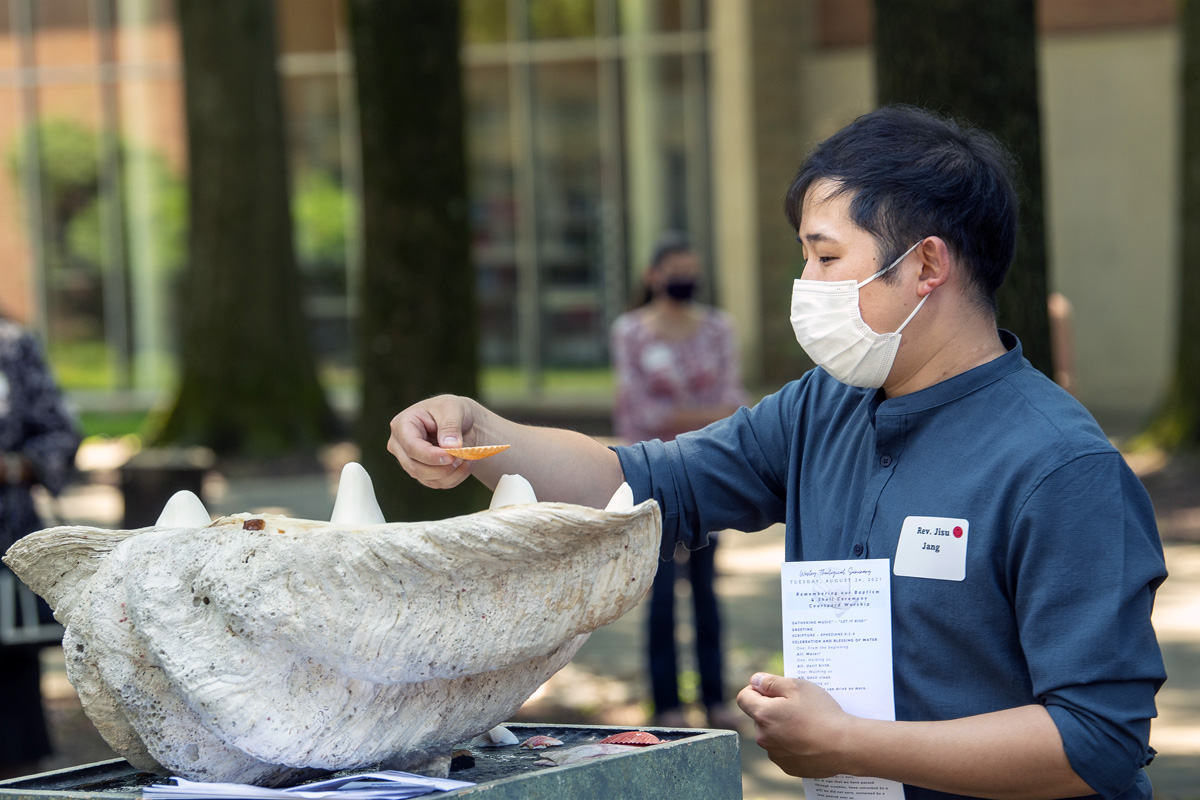Key points:
• United Methodist colleges and seminaries are having to decide about vaccination and mask requirements.
• State policies and laws are a factor in those decisions.
• Seminaries are glad to be meeting in person again but have found advantages in online education.
United Methodist-related colleges and United Methodist seminaries are scrambling with the rest of higher education as another fall term begins in the COVID-19 pandemic.
The arrival of vaccines earlier this year promised a return to something like usual campus life. But schools are resuming amid a recent, sharp rise in case numbers and hospitalizations, due to the highly contagious delta variant and many Americans resisting vaccination.
Colleges and seminaries have had to weigh whether to mandate shots and mask-wearing. Their decisions are hardly uniform.
“I think it’s accurate to say that it’s all over the map,” said Scott Miller, president of Virginia Wesleyan University and immediate past president of the North American Association of Methodist Schools, Colleges and Universities. “It depends on what part of the country how institutions are responding, and it’s primarily because of political influences in the state.”
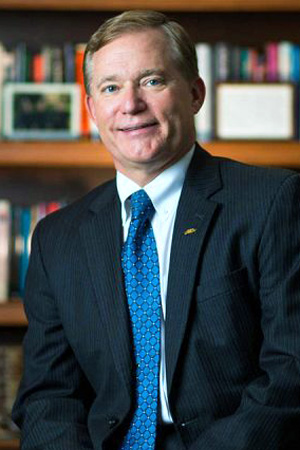
Miller noted that Virginia Wesleyan, in Virginia Beach, is in a Democratic-governed state that has had aggressive public health polices during the pandemic.
Virginia Wesleyan is requiring vaccinations, and Miller said faculty and staff have all had shots except for a handful exempted for religious or medical reasons, and that students have a 98% vaccination rate.
As fall term opens, Virginia Wesleyan will slightly exceed its projection of 400 in the first-year class.
“We had an additional 15 that probably would have come but said they did not want to abide by our vaccination requirement,” Miller said. “(The policy) has not significantly impacted us in the enrollment area.”
Like a lot of schools, Virginia Wesleyan responded to the recent surge of COVID-19 cases with a mask requirement in classrooms and some other indoor settings.
“We know this news may disappoint some, especially given that our community has done its part to keep each other safe,” Miller wrote in an Aug. 13 memo.
At United Methodist-related Huntingdon College in Montgomery, Alabama, masks are required in classroom settings. But politically conservative Alabama has since May 24 had a law prohibiting schools, public or private, from requiring students to prove a change in immunization status.
Meanwhile, Alabama is one of the states struggling most with COVID-19, including having a dire shortage of ICU beds.
Huntingdon is strongly encouraging vaccinations, and about 60% of students have had shots, with staff at 80% and faculty at 100% vaccinated.
“We certainly recognize that all of those statistics are better than the Alabama average,” said Anthony Leigh, Huntingdon’s senior vice president for student and institutional development.
“Certainly our student percentage is well above the Alabama average for individuals (ages) 18 to 29.”

Another United Methodist-related college in Alabama, Birmingham-Southern, has made news with its vaccination policy, which some have criticized as a way around the state law forbidding mandates.
“Due to the lack of federal funds for pandemic precautions this term, all students will initially be charged $500 for the fall term to offset continual weekly antigen testing and quarantining,” the Birmingham-Southern policy says. “Students who are fully vaccinated prior to the beginning of fall term will receive an immediate $500 rebate.”
Millsaps College, in Jackson, Mississippi, is among schools offering vaccination clinics on campus. Though vaccinations are not required at United Methodist-related Millsaps, students who prove they’ve been vaccinated can enter drawings for $500 gift cards.
“That’s our big incentive right now,” said Annie Mitchell, Millsaps’ vice president of marketing and communications.
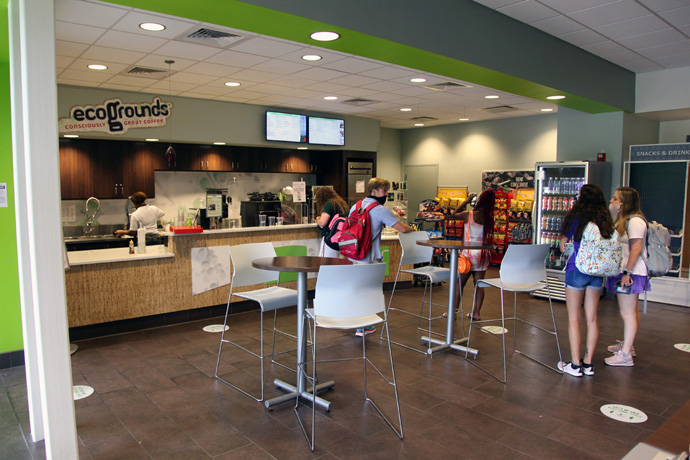
On Aug. 23, the Federal Drug Administration gave full approval to the Pfizer-BioNTech COVID-19 vaccine, a move expected to prompt many employers, including schools, to require vaccines.
United Methodist-related Illinois Wesleyan University, in Bloomington, Illinois, immediately announced a vaccine requirement for students.
The 13 United Methodist seminaries also are having to make decisions about vaccinations and masks.
Claremont School of Theology, with campuses in Claremont, California, and at Willamette University in Salem, Oregon, has decided to stick with online classes only for fall term.
“Our faculty and students were expressing significant anxieties amidst the uncertainties of the COVID situation,” said the Rev. Kah-Jim Jeffrey Kuan, president. “Both California and Oregon have reinstated indoor mask mandates. Given that our faculty are very experienced in remote learning, both synchronous and asynchronous, the ones scheduled to teach in-person learning can pivot quite readily.”
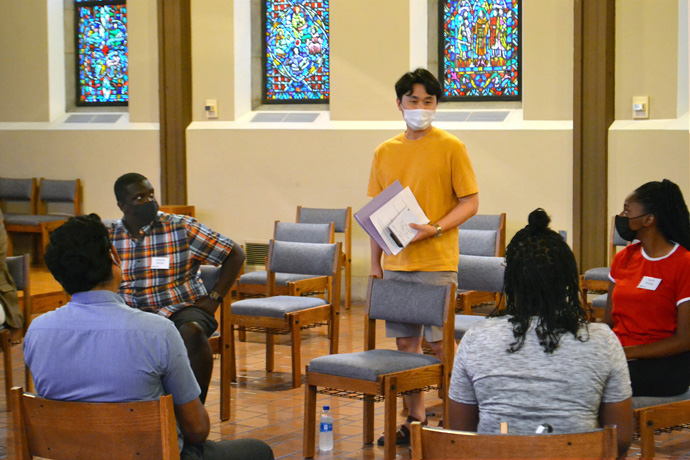
Some other United Methodist seminaries, such as Garrett-Evangelical Seminary in Evanston, Illinois, and Wesley Theological Seminary in Washington are returning to in-person learning for the first time since the pandemic gripped the U.S. in March 2020.
“What I’m hearing is that people are glad to be back in person because of the connection, the community,” said the Rev. Javier Viera, Garrett’s president. “But there is anxiety. And people got accustomed to new ways of working.”
Both Garrett and Wesley are requiring vaccinations and indoor masking for those on campus.
“I’m not going to say we’re back to normal,” said the Rev. David McAllister-Wilson, Wesley’s president. “Nobody thinks that anymore.”
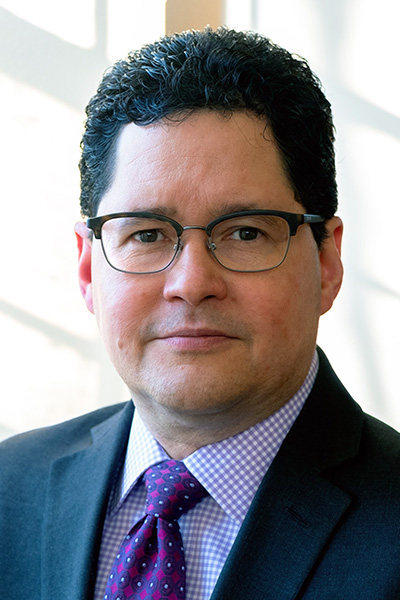
Saint Paul School of Theology, with campuses in Leawood, Kansas, and Oklahoma City, and United Theological Seminary in Dayton, Ohio, are among the United Methodist schools encouraging, not requiring, vaccinations. They report strong compliance.
Their leaders share with Viera and McAllister-Wilson the view that online education has had advantages for seminaries, including strengthening enrollment and better serving apprentice pastors of rural and small-town United Methodist churches, who have time and distance challenges being on campus.
At Saint Paul, chapel had to move online when the pandemic hit, with a 300% jump in attendance.
“It’s continued to be a lot higher,” said the Rev. Jeanne Hoeft, vice president for academic affairs and dean.
Tragic as the pandemic has been, said the Rev. Kent Millard, president of United, it has forced seminaries to innovate faster.
“It made online acceptable,” he said.
But for private colleges and universities, the in-person experience is a huge selling point.
“I don’t think (the pandemic) is going to drive students to online education in the long haul,” said Miller of Virginia Wesleyan. “They want the interpersonal relationships in the classrooms with other students and professors. They want to be able to join a fraternity or sorority. They want to be part of intercollegiate athletics.”
The Rev. Dave Allen is cheered by what he’s seeing as fall term begins at Duke University, where he leads Duke Wesley, the United Methodist fellowship.
“For one thing, we have a full campus now,” Allen said. “We probably have twice as many students living on campus as we did a year ago, when (Duke) took steps to spread out the student population.”
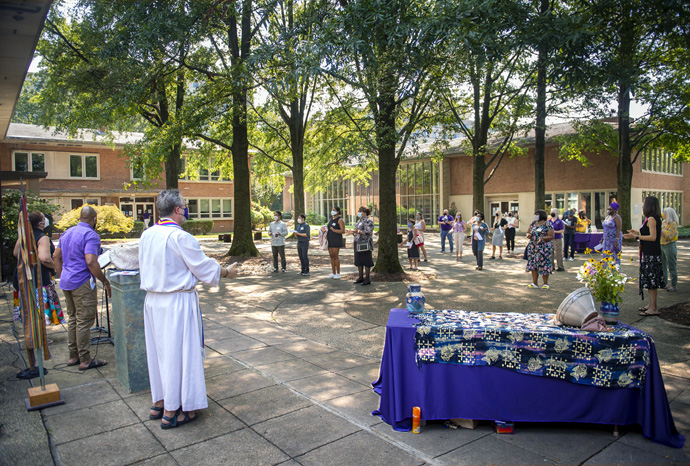
Duke is requiring vaccinations and indoor masking, and with those protocols in place, Allen plans to resume holding worship indoors. He’s eager to have his group sharing Sunday night meals again, too.
“The eating we do together is incredibly important to the fellowship we build,” he said. “We weren’t able to share any meals all during the last school year.”
Huntingdon College had an online-only option for students last year but has ended that, wanting all students to experience campus life fully.
The school is retaining a schedule it experimented with last year — starting fall term early and concluding just before Thanksgiving break.
At least one other innovation from the first pandemic year remains: a food truck, serving hot wings and more.
“That was a huge hit,” said Leigh, the Huntingdon administrator. “It continues to be a popular thing.”
Hodges is a Dallas-based writer for United Methodist News. Contact him at 615-742-5470 or newsdesk@umcom.org. To read more United Methodist news, subscribe to the free Daily or Weekly Digests
Like what you're reading? Support the ministry of UM News! Your support ensures the latest denominational news, dynamic stories and informative articles will continue to connect our global community. Make a tax-deductible donation at ResourceUMC.org/GiveUMCom.

